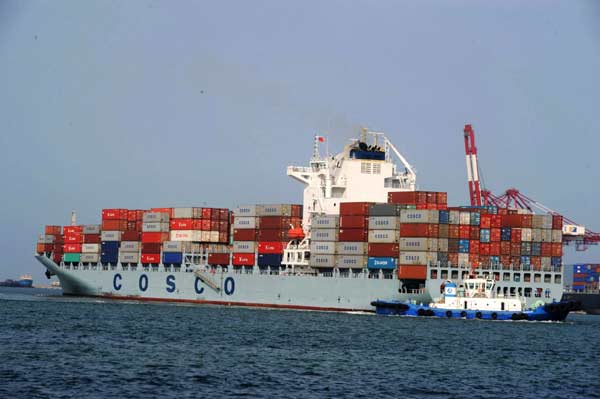SOEs scramble to sell assets
Firms hope to avoid delisting by offsetting annual losses
A number of large State-owned enterprises facing heavy losses are rushing to sell assets to make up for their deficits and avoid getting delisted from the stock market as the end of the year approaches.
However, analysts said that the moves may not be enough to reverse the long-term downturn faced by SOEs in sunset industries, as the companies are also being asked to give up larger shares of their profits and their scale is likely to shrink further.
By the third quarter of the year, seven Shanghai-listed SOEs - China COSCO Holdings Co Ltd, Aluminum Corp of China (Chalco), China Shipping Container Lines Co Ltd, China Shipping Development Co Ltd, China Merchant Energy Shipping Co Ltd, China National Erzhong Group and Huadian Energy Co Ltd - had completed or were preparing the disposal of assets worth 28.4 billion yuan ($4.66 billion).
|
 China COSCO Holdings Co Ltd's third-quarter report showed that a series of asset sales was expected to bring in more than 8.5 billion yuan ($1.4 billion), in a bid to counter losses over two consecutive years and prevent the company from getting delisted. Yu Fangping / For China Daily |
COSCO's third-quarter report showed that a series of asset sales was expected to bring in more than 8.5 billion yuan, in a bid to counter losses over two consecutive years and prevent the company from getting delisted.
In China's A-share market, a company will be suspended from trading if it reports losses for three years in a row, and it will be delisted if the deficit continues in the six months following the suspension.
Also facing a low point in its sector, Chalco is expected to sell a stake to its parent company for 5 billion yuan, which will cover its losses of 1.85 billion yuan in the first three quarters.
China Erzhong has also sold one of its subsidiaries for 3.68 billion yuan, to cover losses of 1.5 billion yuan reported by the end of September, the company said in a recent report.
"We're aiming to offset the deficit, which is a big goal for the company this year. We've disposed of so many assets, but we'll have a bad ending if the losses don't stop," a source at China Erzhong was quoted as saying by the 21st Century Business Herald. "But it's not yet clear whether the sales can cover our losses."
The massive disposal of assets by SOEs comes as 50 companies under the management of the State-owned Assets Supervision and Administration Commission reported losses in the first three quarters, with a total deficit of 19.4 billion yuan, according to Wind Information Co Ltd.
The growth of the aggregate profits of SOEs at the central-government level has decelerated from the 16.8 percent recorded in September to 13.9 percent in October. Meanwhile, the total debt scale continued to climb to 58.4 trillion yuan, according to data from the Ministry of Finance.
In the first 10 months, the electronics, power, real estate, transportation and automobile industries saw faster growth in profits, while sectors such as nonferrous metals, chemicals, coal and machinery suffered a decline in growth.
The recent key Party meeting, which set the course for China's economic reforms over the next decade, urged SOEs to improve the proportion of their capital gains paid in public financing projects to 30 percent by 2020, which will be used to improve people's livelihoods.
Although the asset-selling moves could temporarily retain their listed-company status, analysts said that large SOEs in sunset industries still face a significant number of challenges.
"These SOEs are too big to turn around, and their performances are not necessarily linked to the macroeconomic situation," said Yang Weixiao, a senior analyst at Lianxun Securities Co Ltd.
"The overall outlook of the Chinese economy is stabilizing via structural reforms, but it mainly relies on emerging industries, especially those in the booming service sector," Yang said.
He predicted that the poor performances of SOEs in traditional industries will continue in the short term and added that the scale of the companies will likely continue to shrink.
However, he said, a massive delisting of SOEs is not in the cards, as the securities regulator would issue special policies to prevent that to protect the interests of stock market investors.
"In a different scenario, these SOEs may also break up via another round of massive purchases of high-grade smaller companies or if resources companies use their capital strength," Yang added.
weitian@chinadaily.com.cn


















